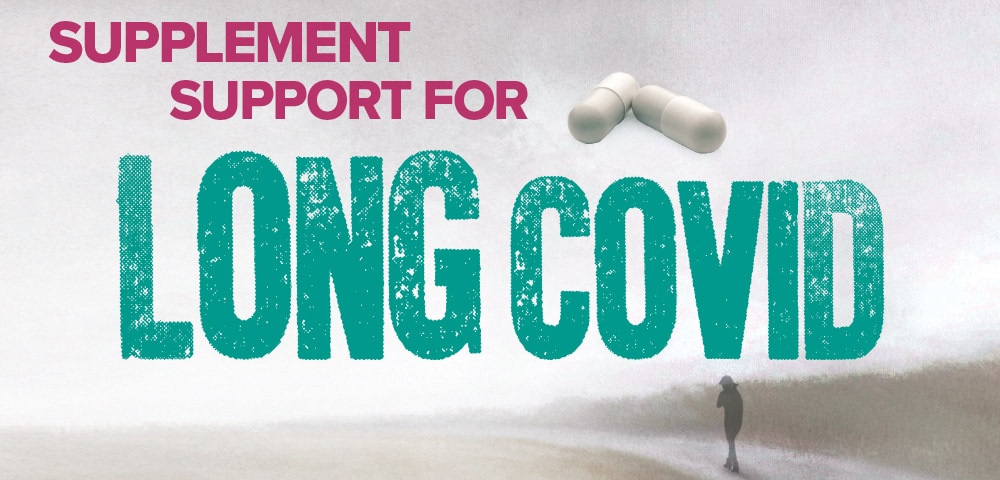
Post-COVID-19 syndrome, also known as long COVID, is a condition characterized by a broad range of long-term symptoms appearing or persisting after the infection period of COVID-19.
By Michael Murray, ND and Gaetano Morello, ND
The symptoms impact daily functionality and can include:
- Fatigue
- Post-exertion malaise
- Headaches
- Shortness of breath
- Loss of smell or distorted smell
- Muscle weakness
- Low fever
- Cognitive dysfunction (in the form of “brain fog,” memory loss, or difficulty concentrating)
- Depression
- Anxiety
The above symptoms tend to wax and wane; however, physical, mental, or emotional stress can lead to a worsening or relapse of symptoms.
Researchers from Stanford University led a global review and found that more than 70% of patients who had recovered from the initial phase of COVID-19 had these lingering symptoms. Long COVID may be a continuation of impaired immunity because of the same factors that led to increased severity in the first place, such as poor nutritional status, stress, and the presence of risk factors like obesity, high blood pressure, diabetes, etc.
MANAGEMENT OF LONG COVID AS A COMPLEX CHRONIC DISEASE (CCD)
Long COVID shares the same features as chronic fatigue syndrome (CFS) and other complex chronic diseases (CCDs) such as fibromyalgia and Lyme disease. Patterns show that many CCDs follow an infectious event. When addressing long COVID, we recommend following a similar strategy to dealing with other CCDs by boosting the activity of three vital functions:
1. Optimize Mitochondrial Function
Energy is the currency of life. The body produces energy in small compartments known as mitochondria. When mitochondrial function is compromised, cellular energy levels are low, which creates a plethora of symptoms that include fatigue and cognitive dysfunction. The brain accounts for only about 2% of our body weight, but it consumes over 20% of the body’s energy and oxygen. The brain requires good mitochondrial energy production to function optimally. Brain fog, one of the main complaints in long COVID, may result from reduced mitochondrial function.
Key nutrients and supplements to improve mitochondrial function:
PROTEIN
(Whey or vegan protein powder, eggs, chicken, beans, fish, oatmeal, etc.)
25 g in the morning
- Helps improve overall energy
- The majority of patients feel positive outcomes within 3–7 days
HIGH-POTENCY MULTIVITAMIN AND MINERAL FORMULAS
100% Recommended Dietary Intake (RDI) levels for all essential nutrients
- All essential nutrients are involved in mitochondrial function, especially the B vitamins
MAGNESIUM
300 mg in the morning and 300 mg at bedtime
- Relaxes muscles and may help improve sleep
- An essential mineral involved in hundreds of biochemical reactions
- The majority of patients find it very helpful
UBIQUINOL
300 mg in the morning
- The active form of CoQ10, with greater bioavailability
- Important in mitochondrial energy production
ACETYL-L-CARNITINE
500 mg three times per day
- Important for transporting essential fats into the mitochondria for energy production
N-ACETYL-L-CYSTEINE
500–600 mg twice daily
- Important in supporting glutathione levels, a major player in mitochondrial health
2. Balance Gut Health
The gastrointestinal tract (gut) is where digestion, absorption of nutrients, and elimination of wastes take place. It also holds 70% of our immune system, manufactures neurotransmitters, and is home to over 100 trillion bacteria that play a significant role in systemic health. In CCDs, digestive symptoms such as gas/bloating, diarrhea/constipation, and acid reflux are common and can interfere with nutrient absorption.
Key supplements to maintain gut health:
ENTERIC-COATED PEPPERMINT OIL (ECPO)
1–3 capsules 20 minutes before meals
- Reduces gas and bloating
- Supports proper peristalsis and the movement of food through the digestive process
N-ACETYL-L-CYSTEINE
500–600 mg twice daily
- NAC is important to enhance gut barrier function and improve leaky gut – a goal in fighting CCDs
QUERCETIN LIPOMICEL MATRIX
500 mg daily
- Exerts anti-inflammatory and anti-allergy effects
GABA
200 mg in the evening
- Helps increase the activity of the parasympathetic nervous system, thus reducing the stress response and promoting feelings of calm and focus
3. Improve Centralization
One aspect of CCDs and long COVID possibly resulting from mitochondrial dysfunction is called “centralization,” referred to as nociplastic pain. This condition disrupts nerve signals, resulting in systemic pain, sensitivity to light and sounds, and low mood. The following protocol has been beneficial in helping with nociplastic pain and its associated symptoms.
Supplement recommendations:
PEA400 (PALMITOYLETHANOLAMIDE)
600 mg twice per day
- Shown to reduce symptoms of pain associated with centralization
- Also boosts mood, and supports immune function and the endocannabinoid system
EPA AND DHA (OMEGA-3 FATTY ACIDS)
2000 mg per day
- Long-chain omega-3 fatty acids EPA and DHA are important in brain function and reducing inflammation
Long COVID will change the way researchers study chronic illness!
CONCLUSION
Our experience in TREATING THOUSANDS OF PATIENTS WITH CCDs has given us valuable insights into the supportive food and supplement therapies we shared in this article, which are HIGHLY EFFECTIVE IN 80% OF OUR PATIENTS.
NEW BOOK COMING IN 2023
Disclaimer: Speak to your health care practitioner before starting any supplement program.














